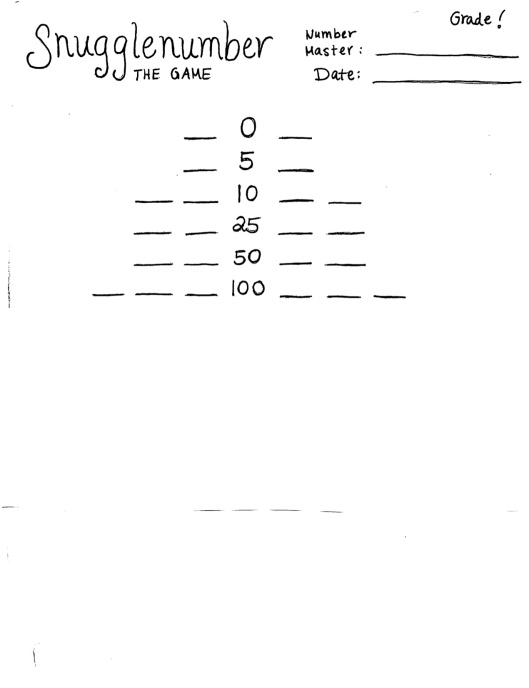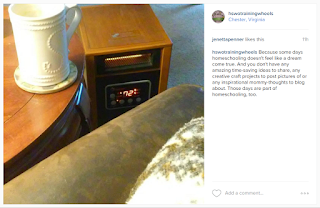One of the things that I have recently found to be a crushing burden of homeschool (
for me,
for now) is the feeling of needing to "finish" something in a given time. I fear that if I don't finish it, my kids will be "behind". I fear that if I don't finish it, I will have wasted the money I invested in it. I fear that if I don't finish it, I'll miss out on that break I was hoping to take when it is all done.
For some (and even for me, in other phases of life) the structure is helpful. It's nice to have someone else plan out what a year's worth of work includes, how much to review when and what should be included in a day of work or practice. It feels very tidy to have five days worth of activity and begin again on Monday. When we are able to get it done, it brings a sense of completion and closure. But those days are getting much fewer and farther between.
Perhaps I'm less able to accomplish something that would be good to accomplish. Perhaps the new pressures and constraints of life at this moment are revealing "shoulds" that never should have been "shoulds" and I am now releasing myself from them. But whatever the case (and in some ways, it really doesn't matter) there is only this: what can we - at this stage, with this present grouping of children and this present, tired mama - accomplish in one day? That is it. What has God given us to do on this day? Let's do it. Let tomorrow worry about itself.
And what if we get to the end of the day and it wasn't all done? Then not all of those things were things God meant for us to do today. Yes, maybe there was time wasted. Maybe we could have been more efficient. But on this day, at this moment, whatever the causes, the task is still the same - trust to the Lord what wasn't accomplished and wake up tomorrow to start on
the next thing.
As much as possible, I have moved away from organizing our subjects such that they must be done on a daily or weekly schedule in order to "work". I've tried to avoid setting up things such that if we miss a day we are "behind" and have to try to cram two days worth of work into one (or three into two). Instead it has worked much better for us if Mama has a general sense of the next thing(s) she'd like to teach or work on with the children. When we come to school time, we do the next thing. And if we don't get to it, it is tomorrow's next thing.
Didn't read a chapter of our read aloud book? It will still be there tomorrow. Talked about place value but they didn't fully "get" the concept? Talk about it some more tomorrow; try another approach. Time to start school but not all the morning chores aren't complete? They can wait until the next slot of time for getting a little work done. (Or, do a little more housework and some school things can wait until later.)
The only way to make this system a reality has been, as much as possible, to unchain activities from each other so that each piece can move forward (or not!) independently. Since our math discussion and written practice are no longer directly linked, we can do one without the other, if needed, on any given day. Since the children's Five-A-Days are all things that we have already covered and they are just reviewing, we can take more time than I expected to work on our current concept without interfering with the Five-A-Day work I picked for them. Or, conversely, if we didn't get a chance to complete the Five-A-Days, they can wait for the next day and our morning math conversations can keep happening.
This week, my oldest was only able to finish three out of the five problems on his Five-A-Day one afternoon. Rather than requiring him to "catch up" on those two and do five new ones the next day, I simply took those two problems, added three more and they were his Five-A-Day for the next day. If we've determined that five problems in a day is what we can manage, then why plan to do seven? There will always be more good things to discuss and practice. What do we gain by "doubling up"? What are we racing against? More and more, for us, the answer is: nothing!

Note: The two subjects that still "need" to fall into a weekly pattern are History and Latin. And for now, I'm going to let them stay that way. I'm not at all convinced that Latin is something all homeschoolers must do, but I have a degree in Latin and, quite frankly, it's something I love to teach. Plus, our pastor's wife and her two youngest come over on Tuesday afternoons to do Latin with us, which is a big plus in the be-with-people category (perhaps even more for Mama than for the kids!). We began three years ago with
Song School Latin and are now working through the
Latin for Children series. We are on Primer B out of C, so after next year we'll reevaluate what to do next.
Though it is not absolutely essential, our history program works best done in five-lesson-a-week rotations because every five lessons covers one topic. I absolutely love the
Veritas Press History for many reasons. Content-wise, it covers history, including Church History, map skills and lots of historical context. Each era of history has its own song which helps the children to have a mental framework for the order and relationship of historical events, as well as some key dates. Another plus is that it is on-line, very interactive, and the kids can do it on their own (mostly) while I watch and listen from the kitchen as I make dinner.





















